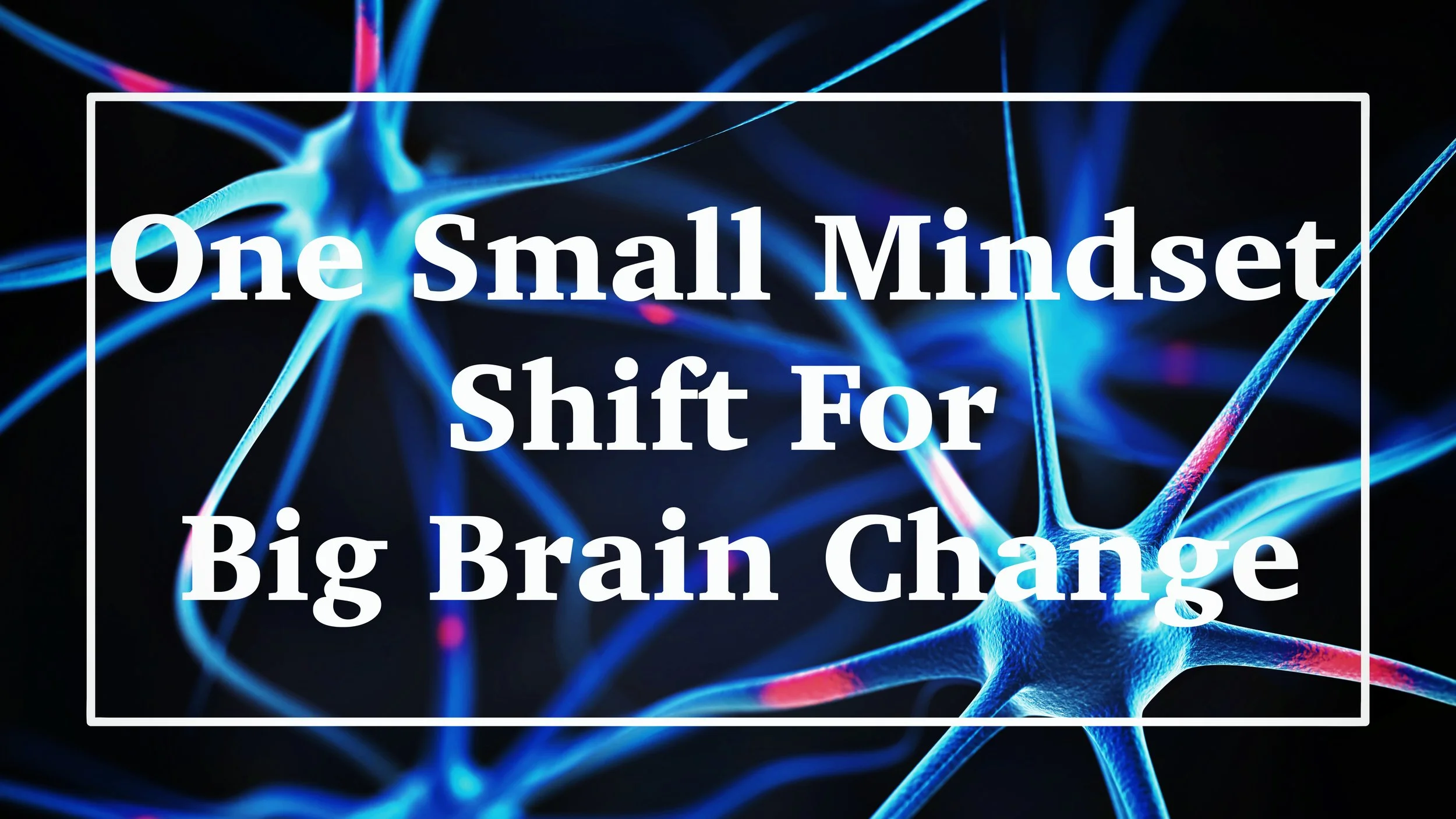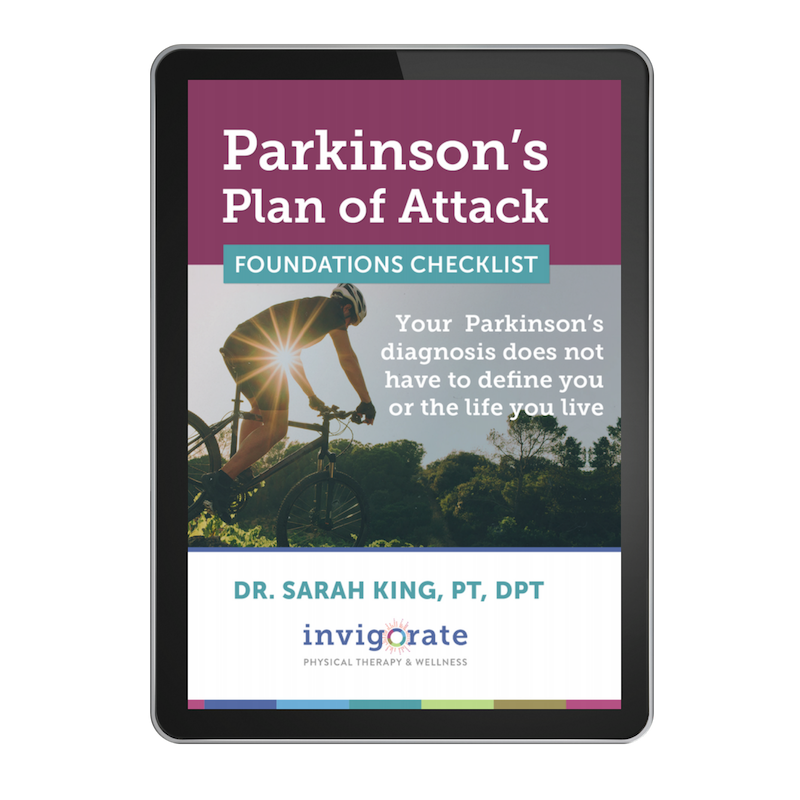(CLICK PLAY TO WATCH) Have you been diagnosed with Parkinson's and hate to exercise? Do you have trouble finding enough motivation to stay consistent with your exercise program? In this week's post, Sarah discusses the one small mindset shift that can help you change your perspective and create big brain changes as a result! (This video is a replay of a previous Facebook LIVE broadcast by Dr. Sarah King, PT, DPT)
Today's topic comes from a question from The Invigorated Community:
Dee writes: "I've been diagnosed with Parkinson's for 3 years. I know I should be more active, but I've never really enjoyed exercising. It's tough now, knowing that my health depends on it. So, what do I do if I HATE to exercise?"
I get it. Exercise, for most people, isn't exactly fun.
If you're new to exercise (or never exercised regularly before a diagnosis of Parkinson's), entering into the exercise world newly diagnosed with a neurological disorder can be challenging and frustrating.
The feelings that come along with exercise can be very uncomfortable:
Sweating... Racing heart beat... Feeling tired, even exhausted... Muscles burning...
On top of discomfort, apathy can be a serious foe. Motivation levels may already be at rock bottom, creating yet another hurdle.
It's a cruel set-up: You hate exercising because it's uncomfortable and exhausting, and you've been diagnosed with Parkinson's which has been shown to benefit the most from regular, intense exercise. You don't just benefit from it, you require it to function.
There are a few ways to navigate this conundrum. There's one approach that's bound to fail, and another that significantly increases your chances of long-term success.
Let's talk about the first approach: logic.
Trying to use LOGIC to negotiate with and convince yourself that you're doing something good for yourself when you exercise.
When I was a personal trainer, and early on in my physical therapy career, this is how I used to try and motivate people to be more active.
Here are some logical reasons you may tell yourself (or your trainer / therapist / doctor may tell you) about why you should exercise:
"It's rewiring my brain."
"It's strengthening my muscles."
"It's making me more flexible."
"It's good for me (for reasons I don't really know)."
Or, the WORST ONE: "My doctor said I need to." (UGH!)
After a while, this logical approach fails. Why?
In these situations, your motivation is external, meaning you're being told exercise is going to benefit you but you have ZERO buy-in and no emotional connection to any of those logical reasons.
Translation: ZERO emotional connection = ZERO motivation to follow through.
What's YOUR "E.C."?
So, how do we find your Emotional Connection (E.C.)?
Let's do a little activity.
Close your eyes and think about something active you currently enjoy doing.
(Examples include: riding your bike, hiking, kayaking, picking your grandkids up from the floor, gardening, walking to shop at the mall)
OR: Think about something active you used to be able to do (not too long ago) that you've stopped doing but want to get back to.
(More examples: getting onto the ground to play with your grandkids, traveling, dancing, bowling, or yoga)
Now, with your eyes still closed, imagine yourself doing that activity...
...Imagine going through the motions...
...Where are you? ...What do you see around you?
Feel your body moving fluidly and easily in every direction you need to go.
How do you feel doing this activity?
... Peaceful? Happy? Free? Calm?
With your eyes still closed, fill yourself up with that feeling.
That, right there, is going to be what you use to re-frame your mindset around exercise.
That feeling of freedom... happiness... peacefulness.. pure joy... THAT is the reason you exercise.
What I'm trying to illustrate is that exercise is an investment in your ability to do that activity and find that feeling, today and in the years to come.
Can you see how using that internal motivation is much more effective than telling yourself it's good for you in some way?
When you look at exercise as an investment in your future self, instead of an inconvenience that someone else has put on you, you're far more connected to your program and, in turn, will get much more out of it.
So, write this new mantra down to use the next time you're struggling with motivation:
"Exercise is an investment, not an inconvenience."
Envision the activity you love to do and let that serve as your emotional springboard to get you up and at 'em.
If the activity you envisioned is crucial to your happiness, then the exercise program that helps you stay there (or return to it) is not optional. This should help you shift your mindset and get back on track, knowing you're exercising for reasons that go beyond pure logic.
A final note about "Minding the Gap"
The mindset shift above can take you a long way, but sometimes we still get discouraged.
When you find yourself frustrated about progress that's not happening fast enough, it's time to "mind the gap."
Focus on what you're gaining (flexibility in a rigid arm, energy, confidence, ...) instead of what you feel like you're sacrificing (comfort, time, ....).
Focus on things you can do now that you couldn't before instead of what you want to do but still can't.
By focusing on what you're gaining, you're able to take a gentler and more productive approach to your program, making you much more likely to stick with the program for the long-term.
Finally, if your exercise program still isn't doing much for you... CHANGE IT!
There are so many ways to exercise! Search out different options and settings until you find something that resonates with you. It may not be traditional, and that's okay!
Make sure you incorporate the 7 essential elements every Parkinson's exercise program should include and grow from there.
Brainstorm: What activities or skills are you trying to maintain or return to? How can you tailor your program around doing those things?
(This is where hiring a creative therapist or personal trainer can be very helpful! They can put together a fun, goal-oriented program and keep you progressing towards things that are important to you.)
Do you prefer indoors or outdoors? Working out alone or in a group? What kinds of things do you think you "probably couldn't do"? I challenge you to try them - you may just surprise yourself!





